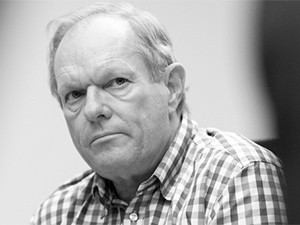
Any conversation about business in Africa will only scratch the surface. There are a few key themes that always resonate, but surround a table with those in the know, and you never fail to hear something new.
This is heartening when the continent is still routinely debased to clich'es and narrow media themes. The international perception of Africa is shallow, and the most convenient, yet nebulous, is Gross Domestic Product.
GDP is often raised as a banner for the Africa Rising narrative, but such a cosmetic view was bound to look bad when the numbers shrink. Thus the first instinct of an Africa-savvy crowd is to besmirch a continental rating, and the attendees at Brainstorm's latest roundtable did no different. Africa has to be measured by the sum of its parts.
"The GDP of Africa should be seen in perspective," says Chris Bell, channel manager for Africa at Interactive Intelligence. "A year ago, some projected 7.5 percent growth, and this year, forecasts had fallen to 4.5. That gives a good idea of what is happening in the oil-based countries. But the countries that are outside those economies are actually doing quite well."
"If you unbundle the continent, you can look at other economies," adds Vodacom Business Zambia MD Thami Mazibuko, noting Zambia's economy slowed due to falling copper prices, hurting its mining sector. But it wasn't enough to cripple the country's economy: "The broader growth on the continent is driven by oil and mining, but there are other sectors that also drive growth. That is a good story, because there is a lot more diversity."
More African countries are expanding their markets, as well as taking the steps to make investment attractive. In Ethiopia, a business can register in eight days. In Rwanda, it may take only a day. This landlocked Central African state has grown substantially in economic prowess, even earning the nickname Africa's Singapore, says Sindi Mabaso-Koyana, executive chair at Advanced Capital.
"The interesting thing is Rwanda doesn't want to be seen as small. There, it's an issue of leadership. Rwanda has actively gone back to the drawing board not to be seen as the country of genocide, but as one of the best countries to attract investment."
The countries that are outside oil-based economies are actually doing quite well.
Chris Bell, Interactive Intelligence
Other rising stars mentioned are Tunisia, Botswana, Tanzania and Uganda. But success should be seen through a regional prism, says Brett Stevens, GM for Africa at First Distribution: "Kenya had a tough year last year, so did Nigeria and Angola. But if you look at the markets around them ? Cameroon, Senegal ? they did well. East Africa had markets doing well. Southern Africa did well."
Yet this doesn't mean the heavyweights aren't attractive. Steven Sutherland, sales director (Africa) at Mix Telematics, points out that Nigeria is a large economy with a lot of influence. The problem with a purely analytical point of view is how it fails to see the forest for the trees: "If you measure Nigeria externally and on paper, the numbers make sense. But you need to go into an economy and see what happens there. It's a massive economy with a lot of people. It all adds up."
The long-term gold rush

The argument that economies should be approached through a localised strategy is frequently brought up by those who travel the African Silk Road. It is wisdom tied to another fundamental observation: expect no quick wins.
"The key thing here is the approach of 'gotta get me some of that'," says Desan Naidoo, SAS' MD for Southern Africa. "So companies use SA as their base, hop onto a flight and address other markets. A lot of those companies are no longer playing in that space. The approach we've seen is more about presence. Building that presence through local partners is key and making sure you build an ecosystem to support that. It's not a market where you can do a call centre approach to support from SA as your hub. It doesn't work."
Yet even when done right, expansion is a risky venture. African economies are highly competitive, some with a penchant for disruption resembling the spectre of a black swan. From hefty fines to natural disasters to human calamity, Africa does not cater for the meek. But its diverse economies create a means to survive the rough patches.
"We were in Egypt for many years when the revolution struck. Imagine what happens to your business when that occurs," says Perry Hutton, Fortinet's regional director (Africa). "In Tunisia, when the beach attack happened last year, business died instantly. The Ivory Coast crisis...That's why your operations need to be spread, because you shoot yourself in the foot if you don't."

Sutherland agrees: "Your ROI (return on investment) needs to be seen as a whole. If you had to go into one country and have a bad ROI, you're going to pull out. So you don't put all your eggs into one basket."
But the sophistication of the various markets is allowing for more than one approach to this strategy. Howard Blake, chairman of Blake Holdings, adds how their business model, fashioned around digital services and web access, creates organic growth across multiple local countries.
"At an entrepreneurial level, we're starting to get all sorts of enquiries from a wide diversity of countries. It's because of the pervasive nature of digital services. It's getting a lot of government interest around setting up hotspots for distributing e-services."
By tackling a direct service problem for many African consumers ? the cost of data and access online ? and tapping local partners, they are able to engage multiple markets without large upfront investment.

But partners cannot simply act as proxies for the immigrant enterprise. Local markets are sophisticated and have grown savvier. The rules of consistency in business aren't foreign to Africa.
"We have to try and ensure that customer experiences across the continent are the same," says Mazibuko. "That's a big challenge. If you are used to getting an experience in one country, it should be the same in another. That levels the playing field in terms of taking away the perception that the standards will be lower in this or that region. It is your company representing your brand and your way. So you focus on instilling practices that identify you as a leader in the market, to make sure your people know how to deliver the same expectations for your customers across the continent."
Business fundamentals still count, agrees Steve Herridge, sales director MEA at Mimecast: "You have to look at it on a country-by-country basis. Ultimately, we're in business. Ultimately, it started as an ROI."
The table has a slight split around ROI: should a company go into an African market with the expectations of returns as its core benchmark? While everyone agrees that ROI is a key measure, some reiterate the need to lay groundwork.

"For us, the challenge is finding deals of large enough size, thus making a strong push for the country," says Chris Hogan, partner at Baker & McKenzie. He explains that he came to Africa with experience from central and east European developing economies. What surprised him was the slower uptake in markets: "With the big deals you got into first, you had no real disadvantage to anyone else. In Africa, it seems to me that you really do need to start small, get your feet wet, know how to do deals in particular markets and build up proper appreciation of the regulatory environments, which aren't just the rules. It's how they're applied. I think you need to get in early, not worry so much about the ROI, do a few exploratory deals and look at them as a means to an end."
From Africa with love
Hogan adds that this message needs to be related back to the international partners: Africa is business unusual and increasingly there is little success in enforcing external business models. It goes back to the problem of summarising the continent with a few glib statistics, sometimes bordering on a cargo cult mentality.
"They are looking at the balance sheet. That's what drives them," Herridge says of international perspectives, adding that this is not at all how African economies see things. "I lived in Lagos for four years and the thing I learned was to look at Africa through a different lens. Even the way we were discussing it ? that these nations have 'proven' themselves. In their mind, they are not doing that. They are in their minds the biggest, fastest, brainiest people and they are not waiting for us to come and save them."

Mark Walker, VP and Africa consultant at IDC MEA, agrees. In recent conversations with international investors, he can see a clear renewal of interest in the continent. But to really capitalise on this, African economies need to lay down the rules: "Honestly, we as Africans need to push back. We've very much been market takers. Now we have to make market and we have to push back: guys, how do we measure? You want these kinds of returns ? fair enough, but we have to manage expectations back. We have traditionally been weak at saying, 'Your expectations are out of line'. The Americans, Chinese, Europeans...they will always look at ROI and cost of sale. They will constantly be surprised at all the hidden costs of business in Africa. But it's a reality. If you're going to play, you have to invest."
This line of thought inevitably leads to South Africa, a place that projects an aura of isolation to the rest of the continent. Says Blake: "Recognise we're part of the continent. We say we're going overseas when we're going to Mozambique!"
Are South Africans still acting like boorish foreigners? Bell says it still exists, but it's a changing process. Nonetheless, "we're perceived as being extremely arrogant. Sometimes we don't intend to be arrogant, but we come across that way."

Naidoo adds that this is not just a business problem. Relations between South Africa and other countries are important ? highfalutin attitudes over what concerns our continental compatriots do serious damage: "I was in Nigeria last year during the xenophobic attacks (in SA) and I was reminded of that in every single meeting: how distasteful it was and the commitment of Nigeria during SA's struggle for freedom. It hurt them."
Other attendees echo this: one even says during that period, some Kenyan business people refused flat-out to meet, demanding SA first sort out the attacks on foreigners. Is there a single philosophy the country should take to heart towards Africa? Stop being opportunistic, stop comparing, the room agrees unanimously.
But Hogan offers a reprieve, saying South Africans are a bit hard on themselves "In the UK, we have a tradition of going in and telling people how to do things. Yours is a much more softly, softly approach. And you ARE in Africa, which makes a big difference. Culturally you are a lot closer."

The final word, though, comes from Mazibuko, calling for the continent to unify its qualities: "We must learn to pull together, because there are different strengths that come with different regions. There is something ? a reason ? why Kenya is so ahead on electronic money, SA ahead as an export economy, etc. So we have to find a way to say: who is good at what, how do we harness that together from a continental play perspective to win? That is a key focus area most companies haven't mastered yet."
The growing sophistication of skills
Engaging an African economy usually comes with the requirement to indigenise: even though a company keeps its internal culture, it is expected to embrace local channels, partners and employees. A lot of these expectations surround skills, both in employing skilled locals and transferring skills to the local market.
Attendees at the roundtable warned against making the mistake of only seeing skills as an import product. Instead, many of the countries, particularly the larger economic hubs, have been seeing an influx of talent as more expats return to their countries, bringing new abilities to the table. This is particularly evident in the financial sectors.
But there is still a need for companies to introduce skills. It's a healthy investment, not only for the company's new foster country. Skills, particularly at a vendor level, attract other companies tied to that value chain. Encouraging certain abilities in a market acts as a lure for more business.
The proliferation of skills among local workforces is a key pillar to building the continent's financial girth, yet today it demands more sophisticated knowledge at a grassroots level and rewards companies that reciprocate on that.
Share